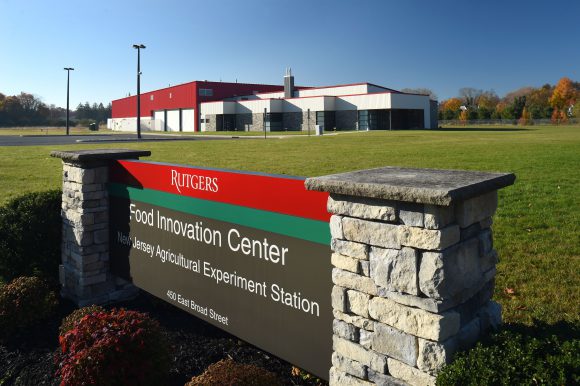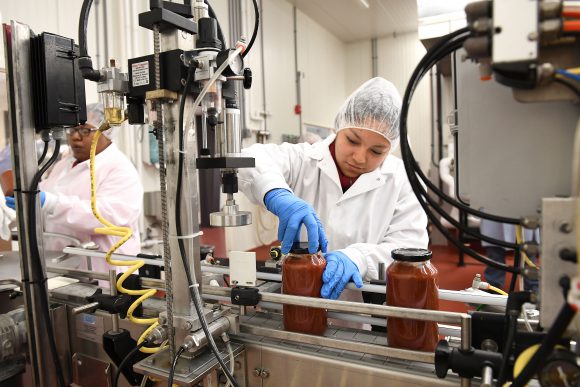
The Food Innovation Center launched FoodBIN, a global food incubator network, to foster collaboration and share resources with similar organizations around the world. Photo courtesy of The Food Innovation Center.
The Rutgers Food Innovation Center launches FoodBIN, a global network of food-based business incubators
Where do entrepreneurs from New Jersey and around the world go to for assistance to launch or grow a food business? Rutgers.
Rutgers Food Innovation Center, a business incubator that is part of the New Jersey Agricultural Experiment Station at Rutgers University-New Brunswick, is seeing a growing stream of global and domestic companies contacting them about resources and assistance to develop their businesses.
Since 2001, the center has helped more than 2,000 food businesses, from a California-based company that makes vegan burgers to a gluten-free bread company from Italy that eventually opened a production facility in New Jersey, employing over 50 people.
It also has a strong focus on helping businesses in the Garden State such as First Field, a company that it is now sourcing over 500,000 pounds of tomatoes each year from New Jersey farmers – as the result of relationships fostered by the Food Innovation Center – to produce a locally made ketchup and other products.
Now the Food Innovation Center is branching out to share its expertise. The center recently launched the Food Business Innovation Network, or FoodBIN, a global food incubator network, to foster collaboration and share resources with similar organizations around the world.
FoodBIN recently held its inaugural conference at Rutgers. It was organized in partnership with the International Business Innovation Association, with a grant from the U.S. Department of Agriculture Rural Development. Leaders from over 20 different incubator programs from around the world spoke at the conference, and shared information about food trends, new technologies and best practices.
“The food industry is exploding,’’ said Peggy Brennan-Tonetta, Rutgers associate vice president for economic development, associate director of NJAES and co-founder of FoodBIN.
Brenna-Tonetta said the food sector has seen exponential growth since the Food Innovation Center facility in Bridgeton opened in 2001.
“This is being driven by changes at every level: By individuals who want to explore and experiment with new food products to start-up companies developing disruptive food technologies to large firms seeking to expand product lines to meet the demand for food that is not only tasty, but also good for you,” she said. “It’s really become a hot area, it is open to anyone and is a great tool for economic development.’’
Today’s food culture has led to an increase in demand for the services of food incubators that support businesses as they develop. It also highlights the need for an organization such as FoodBIN, Brennan-Tonetta said.

Since 2001, the Food Innovation Center center has helped more than 2,000 food businesses. Photo courtesy of The Food Innovation Center.
“FoodBIN is meant to serve as an association specifically for food business incubators, acceleration programs, and shared-use commercial kitchen operations, said Lou Cooperhouse, executive director of the Food Innovation Center and a co-founder of FoodBIN. “Such a resource did not exist before and we felt it was critically important to communicate the diversity of food incubation models that exist today, and the tremendous success these programs are having at fostering entrepreneurship in communities worldwide.
He said the Rutgers Food Innovation Center has been globally recognized for the services and impacts it’s made. “We are pleased to support the development and enhancement of other incubation programs, while also fostering enhanced collaboration among our programs,’’ Cooperhouse said.
The Food Innovation Center has attracted companies around the world from Greece, Italy, Jamaica and Columbia as well as domestically, from California to New Jersey. The center provides a broad array of business and technical mentoring services; training programs in food entrepreneurship and product safety; and USDA- and FDA-inspected facilities that enable design, development, analysis, commercialization and manufacture of value-added food products for sale to retail and food service markets.
Takis Solomos of First Athens in Greece, an investor who has worked with the Food Innovation Center to bring one company to Lyndhurst and is exploring locating others in the state, said Rutgers has helped as they look to introduce products in North America “in the easiest, quickest and most cost-effective way possible.’’
In working with the Food Innovation Center, “I feel that together we have established a track record and, based on this, we will be even more effective and efficient going forward,’’ Solomos said.
The relationship with First Athens serves an example of how the Food Innovation Center can help differentiate New Jersey from other states when global companies are looking to expand, Cooperhouse said.
“We are in a unique position to be able to educate the world in best practices and food business incubation at a time when this is such a hot category, not just in the U.S. but around the world,’’ Cooperhouse said.
FoodBIN is a way for Rutgers to highlight its success as a major economic driver for the state that has helped to launch scores of local food businesses and also attract international companies to New Jersey.
“As Silicon Valley is a business cluster for the tech industry, we are trying to create that reputation and a similar model of a business cluster in New Jersey for our food sector,’’ Cooperhouse said.
Editor’s Note: this article originally appeared in Rutgers Today.

